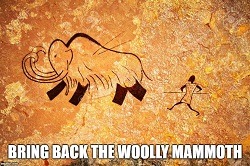

 The Accurate Reloading Forums
The Accurate Reloading Forums  THE ACCURATE RELOADING.COM FORUMS
THE ACCURATE RELOADING.COM FORUMS  Hunting
Hunting  African Big Game Hunting
African Big Game Hunting  Wild animals threatening Botswana's farms
Wild animals threatening Botswana's farmsGo  | New  | Find  | Notify  | Tools  | Reply  |  |
| one of us |
http://www.news24.com/Green/Ne...wanas-farms-20141228 Wild animals threatening Botswana's farms 2014-12-28 13:19 Rakops - As roaming animals destroy crops and damage property, frustrated locals wonder: does Botswana's government value the animal kingdom more than its citizens? For 21-year-old Botswanan farmer Letsile Pataabotwe, the majestic elephants that tens of thousands of tourists come to admire every year are nothing but trouble. "A few weeks ago, I saw a group of them trampling our fields," says Pataabotwe, who works on his mother's land in Rakops, outside the north-eastern border of the central Kalahari Game Reserve in the centre of the country. "I reported the incident to the wildlife authorities, but I had already lost 300 sacks' worth of maize," the young farmer says in front of his concrete house, peering over the road to the fields. Pataabotwe's problem reflects a decades-long conflict between man and beast in Botswana - one that affects hundreds of thousands of people living near conservation areas in the southern African country. "The compensation I will get from the government after months will not be anywhere near what the harvest would have been worth," he says. "Elephants should all be killed, or sold to other countries!" Nearly 40% of Botswana falls under two categories of protected land: game reserves, where the only human activities are conservation efforts and tourism; or wildlife management areas, where the rules on human activity are less strict. The country's conservation policies in turn support its tourism industry, which is based almost entirely on wildlife and makes up nearly 9% of gross domestic product. These policies also affect another aspect of Botswana's economy: cattle. Today, the country's nearly 3 million heads of cattle are mostly owned by the beef industry, which analysts describe as having links to politicians. But the roaming cattle of smaller-scale farmers are threatened by the wild animals wandering the land - animals that include elephants, lions, leopards and others, according to John Weldon McNutt, who heads the Botswana Predator Conservation Trust in Maun. The wealth of a Botswanan has traditionally been measured by the number of cattle he or she has, and a farmer's loss of cattle to a predator represents a blow to his livelihood. According to experts at the University of Botswana, thousands of kilometres of double wire fences were erected around wildlife areas between the 1950s and 1990s. The move was prompted in part by the European Union, a major importer of Botswanan beef, which wanted to prevent buffaloes from infecting cattle with foot-and-mouth disease. The fences prevented animal herds from using migratory routes in search of water in the dry season, leading to the deaths of hundreds of thousands of wildebeest between 1979 and 1985, said fencing expert Richard Fynn from the university. Animals have now adapted to the fences, which in some cases have saved zebras and wildebeest from starvation by segregating their feeding ground from that of cattle, wildlife expert Chris Brooks said. But the fences have not been as effective in keeping wild animals away from areas of human settlement. According to locals, elephants knock fences down, destroy crops, tear up water pipes and invade waterholes used by the community - clearing the way for other animals to come through in their wake. "Jackals attacked my sheep, and my neighbour's donkeys were maimed by hyenas," Pataabotwe says. Hunting is banned in Botswana, but farmers often grab a gun or resort to poison when a wild dog or a leopard attacks their livestock. "The killing of a cow by a wild animal is viewed very seriously by police," McNutt said, explaining that the authorities often overlook the shooting of a predator by a farmer whose cattle was attacked. Official farmers' representatives declined to be interviewed, saying they were discussing problems related to property damage with the government. President Ian Khama's government has been lauded internationally for its conservation policies. But many Botswanans feel the authorities "regard wildlife as being more important than people", said Gaseitsiwe Masunga, a research scholar on landscape ecology at the University of Botswana. "We support tourism, but who wants to lose his cow to a lion?" asked one farmer, who spoke on condition of anonymity. The government is trying to win acceptance of wildlife with educational measures and by encouraging tourism companies to share some of their profits with local communities. But as farmers continue to lose livestock to predators, solving the conflict between humans and wildlife may require a more effective compensation system, McNutt said. Innovative ideas, he added, could also help. Instead of trying to separate humans from wildlife with fences, McNutt's Botswana Predator Conservation Trust proposes using animal faeces, urine or similar chemical substances to mark territorial boundaries that animals would naturally respect. "The technique could be used with lions, leopards, hyenas, wild dogs and possibly even elephants," said McNutt, whose organization is developing chemical substances for the technique in its laboratory. - SAPA Kathi kathi@wildtravel.net 708-425-3552 "The world is a book, and those who do not travel read only one page." | ||
|
| One of Us |
Botswanas policies is the road to peridition for the wildlife, if they do not open for sport hunting again poaching will explode.. | |||
|
| One of Us |
And who wants to loose their cow to a wolf? Parallel universes. ~Ann  | |||
|
| Powered by Social Strata |
| Please Wait. Your request is being processed... |
|
 The Accurate Reloading Forums
The Accurate Reloading Forums  THE ACCURATE RELOADING.COM FORUMS
THE ACCURATE RELOADING.COM FORUMS  Hunting
Hunting  African Big Game Hunting
African Big Game Hunting  Wild animals threatening Botswana's farms
Wild animals threatening Botswana's farms

Visit our on-line store for AR Memorabilia

